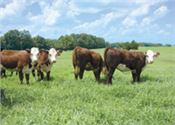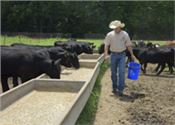|
Price, Numbers Are Up For Beef Cattle In Mississippi

Shade from the summer sun is necessary to keep cattle cool and their feed intake high. These cattle were at the H.H. Leveck
Animal Research Center at Mississippi State University in Starkville July 8, 2015.
STARKVILLE, MISS.
Record beef cattle prices are making Mississippi producers happy to be in the business this summer.
Brian Williams, a Mississippi State University Extension Service agricultural economist, said 400- to 500-pound Mississippi calves are selling for $282.50 per hundredweight, and 700- to 800-pound steers are selling for $200 per hundredweight.
“Mississippi feeder cattle prices are higher this year than a year ago by about $20 to $30 more per hundred pounds,” Williams said.
The majority of Mississippi’s beef cattle are sold as lightweight feeder cattle sent out West to finish in feedlots. According to the latest U.S. Department of Agriculture numbers, about 64 percent of Mississippi cattle sold last week were under 600 pounds, and just 11 percent were feeder cattle over 600 pounds.
Beef cattle prices typically dip in the fall as calves are taken to market. Prices dipped this summer because of uncertainty over corn acreage and prices.
“On the other hand, recent rainfall helped pasture conditions in much of the country, which has allowed producers to retain more replacement heifers and grow feeder cattle to larger weights before sending them off to the feedlot,” Williams said. “That, in turn, has hurt supplies of feeder cattle, which helps prices.”
These prices and the expansion of herd size are especially good news for Mississippi’s cattle producers, who have struggled in recent years.
“According to the USDA Census of Agriculture, the number of Mississippi farms with beef cattle declined by 8 percent between 2007 and 2012,” said Cobie Rutherford, Extension beef associate. “As herds liquidated, the total number of cattle began to decline across the state.”
Rutherford said the total beef cow population in Mississippi declined more than 5 percent during those years and slipped an additional 5.5 percent since 2012.
“Based on the same report, beef replacement heifer inventory is up 4 percent from 2014, so it looks like we might be seeing a reduction in the liquidation phase for Mississippi beef farmers,” he said. “There also has been a decline in the number of heifer calves sold at auction.”
The low beef cattle numbers in recent years left room for growth in the industry.
“There should be new opportunities available for new and young farmers to pursue in beef,” Rutherford said.
Brandi Karisch, Extension beef cattle specialist, said many producers are expanding their herds and keeping more heifers so they can have more calves in the future.
“Calves are selling for $1,500 or more now through the local sale barn,” Karisch said. “With current record high prices, producers are even more mindful to take the best care of these valuable calves.”
With no major feed lots in the Southeast, Mississippi’s commercial beef cattle production focuses on cow/calf and stocker cattle production.
“Many beef producers have calves born in the spring and then wean and take them to market in the fall,” Karisch said. “The majority of our producers sell their calves at weaning, when they are 6 to 7 months old and weigh about 500 pounds.”
Summer heat slows down calf growth, as animals eat less when temperatures rise. Shade is very important to keep cattle cool and eating well.
“A big consideration is how much shade is available in the pasture for the number of cattle a producer has,” she said. “Too little shade can turn that area into a very muddy place. With small calves, that can lead to some disease issues.” ∆

Cody Glenn, Mississippi State University beef unit manager, feeds calves at the H.H. Leveck Animal Research Center in Starkville July 8, 2015. Recent cattle prices have been at record levels, causing producers to increase the size of their herds.
Photos by MSU Ag Communications/Kevin Hudson
|
|